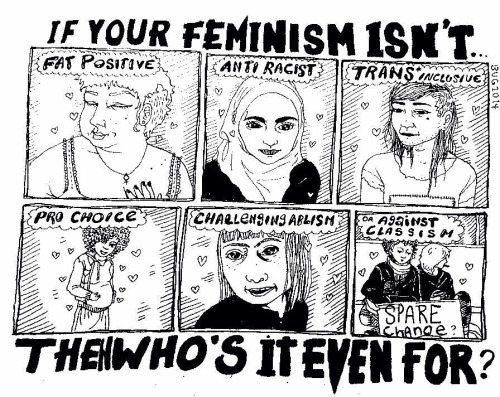Lately, there's been a pattern repeatedly taking place in the pop-o-sphere. A reporter asks a woman (usually a young actress) if she's a feminist.
If she says, "Yes, unequivocally," there's some cheering from the feminist camp and some grumbling from others about how she probably hates men (or if she says more than that, she could be subjected to online terror like name-calling, threats, and doxxing). And a lot of people will comment on how she looks.
If she says something like, "Well, I believe in equal rights but I don't think I'd consider myself a feminist because, you know, I like men," then a bunch of people shout at her that believing in equal rights makes her a feminist and isn't she ignorant. And a lot of people will comment on how she looks.
Sometimes men are asked if they're feminists, and a lot of the time they're all: "Yeah, my mom/girlfriend/wife/sister is a really strong woman." Then everyone goes, aww, that's so sweet.
I'm glad that the word "feminism" is getting play in the popular dialogue, but now that it's having a moment, it's time to elevate the conversation. The types of dialogue described above help no one. At least, no women. Whether women do or do not claim feminism, they face ridicule or worse.
So how can we shift the conversation in a more productive direction?
1) Avoid reductionism
 |
| When Gina Rodriguez was asked if she was a feminist and said no, this was the reply. I love how open-minded Gina is, but wonder if we're making being a "feminist" too simple. Photo credit: here. |
Let's imagine that we woke up tomorrow and the ERA had passed, and women and men were completely equal under the law. Also, in this magical night, women's paychecks became equal to men's, and all laws that privileged men were taken off the books. Would feminism become unnecessary?
I would argue no, because the cultural patriarchy would still be intact.
If we pass laws so that rapists are prosecuted fully, will that mean we're free from rape culture? If women are given equal rights within the military, will we stop killing women and children in other countries? If men and women are completely equal in marriage, but our lesbian sisters can't marry in all fifty states, are we truly equal?
Besides the fact that feminism is about more than just equal rights (although it's definitely about that), there are lots of different brands of feminism... as many as there are women.
So let's stop trying to convince women who don't identify as feminists that they are "really" feminists by getting them to accept a reductionist definition of a diverse and complicated movement. Instead, let's engage others in a dialogue about what the systems of patriarchy really are, how they are intertwined in all aspects of our society, and how we can work together to dismantle them.
2) Don't make it about dudes
Look, as a straight feminist woman, does my heart go pitter-pat when I see a favorite male celebrity wearing a feminist-themed t-shirt? Sure.
 |
| Do you think, "I'm attempting to dismantle patriarchy" would fit on a shirt? Photo credit: Elle UK |
First, while it's great that campaigns like #heforshe point out that patriarchy hurts men as well as women, we need to make it OK to argue that even if it didn't, we should still dismantle it. We need to argue that it's right and moral to consider women's rights without reference to men's feelings, desires, or needs. You know, because women are people.
Second, I love it that lots of men consider themselves feminists. I believe that men can be feminists, which is in itself sort of controversial among feminists. Yet it has to be the prerogative of women to confer this status on men. Just as, as a White person, it is not my right to name myself an ally to people of color, or as a straight person, to call myself an LGBT ally; men should let women confer allyship to the feminist movement.
Instead of men saying, "I'm a feminist," how about: "I'm trying to be anti-patriarchal." I know it's not as cool on a T-shirt. But it will elevate women's voices and acknowledge that men benefit from the privileges of patriarchy whether they want to or not.
Another way that men can be allies: make the internet safe for all of us to talk about feminism. Call out your brothers who doxx, threaten, and bully women online. Refuse to be silent when other men joke about rape, call for women's submission to men, or when women are called ugly and fat (or beautiful and elegant) in conversations about issues.
3) Make it inclusive
 |
| Photo credit: here (if you know the original illustrator, please let me know so I can credit!) |
I believe that the patriarchy is deeply embedded in a system that is White supremacist, hetero-
normative, and oppressive to well... do you have all day?
Yet feminism often refuses to hear the voices of women of color, trans women, religious women, etc. A woman shouldn't have to feel like her feminist sisters will criticize her if she decides to wear hijab. Trans women shouldn't be barred from feminist spaces. And no woman should have to choose between her family's culture and her own equality. When we make feminism only about White, upper middle class women's lived experiences, we reinforce the patriarchy, rather than taking it down.
I recognize that these three things are not easy. Yet I believe they are worth doing, so that we can take advantage of the resurgence of discussion about women's rights. If we don't do these things, I fear that the moment will pass, and we will be in the same place we were before the word "feminism" began popping up all over the internet.

No comments:
Post a Comment